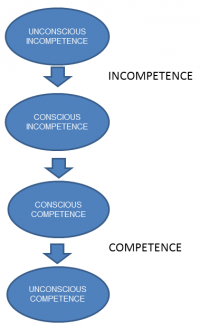SureFire Learning Approach
Conscious Competence and the Four Stages of Learning
Do you know what you don’t know? Have you ever had a difficult time trying to coach an employee? Having a fundamental understanding of learning models is essential in formulating an appropriate teaching and development program. Learning models provide ways to think about the process of how people learn, they provide insight into learning obstructions, and help us to develop a plan for instruction. One example is the “Conscious Competence “ model of learning also known as the 4 Stages of Learning. This model suggests that individuals in the first stage are unaware of how little they know. They are completely unconscious of their incompetence. The next stage occurs when they recognize their incompetence and consciously work to improve their knowledge or ability. In the final stage, the knowledge, skill or ability comes naturally without really having to think about it, and becomes an unconscious competence. We often are motivated to learn more about an issue when we find out that we don’t know something when it is important to us. However, if we are unaware of our ignorance, we may continue on blissfully unaware that we don’t know vital information.
Stage 1 – Unconscious Incompetence
Many individuals with some knowledge or experience feel that they have very little to learn from those they work with who may have more experience in their position. As an unconscious incompetent, they are not aware of what they don't know. There is a lack of knowledge and skill in the area of question and they are often unaware of this deficiency. Many individuals remain in this state of incompetence for extended periods of time. Some examples of this stage include:
- Unaware of the existence or importance of the knowledge or method.
- Has difficulty admitting that they have a deficiency in the areas of concern.
- Denies the relevance or usefulness of information.
These individuals must become conscious of their incompetence before improvement can begin. Allowing the individual to make and understand their mistakes can be integral to moving to the next step. The goal is to move the individual into the conscious stage where they can then be motivated to become competent in the areas of concern. The individuals in the unconscious incompetence stage also may be in a disillusion state, where they perceive themselves as competent, and fail to recognize their state of covering up their incompetence.
Stage 2 – Conscious Incompetence
Those with conscious incompetence realize that they do not posses the expertise previously thought. In this stage the individual will recognize that they do not understand or know how to do something well. They can understand the value of becoming more proficient and the need to improve. Developing a focused and detailed coaching plan can help individuals improve their knowledge or skill in the area of concern. Individuals can also exist in this state for a long time, depending on factors such as their motivation to learn, opportunities for training, and the real extent to which they acknowledge and accept their incompetence.
Stage 3 – Conscious Competence
In this stage the individual understands or knows how to do something but must actively concentrate on performing the skill. Self-confidence improves with increased knowledge or proficiency of the skill. Routine practice of the skill set and regularlly scheduled reviews of the knowledge may be required to maintain competencies at this level.
Stage 4 – Unconscious Competence
When an individual becomes so well practiced in a skill that they hardly know they are doing it, they have reached the unconscious competence stage. The knowledge becomes second nature and the skill can be performed well without thinking about it. At this level one can become complacent or become so unconsciously competent that they may not focus properly on the task at hand. Accidents can occur as a result of the skill becoming so familiar and seemingly routine that proper attention to situational awareness could possibly become compromised. Check lists, policies and standard procedures can be developed to help mitigate the potential for error due to over familiarity.
Those operating in high risk environments or critical functions present an extreme liability in the unconscious incompetence level. Understanding the four stages of learning; and recognizing the levels of consciousness and competence is important in development of coaching and training plans. This awareness is also extremely important in finding areas of improvement and helping to avoid catastrophic failures. An organization can get away with unconscious incompetence as long as all of its competitors operate at the same inefficient level. However, once adjoining affiliates becomes competent, the arena changes. Suddenly, there’s a pressure to match or exceed the standards as they related to competency, experience, and efficiencies related to safety.
Our approach to your learning goes beyond a basic level of instruction. Our attention to detail and the integrity we bring to the learning environment are only a few of our trademark efforts that set us apart from other training, service and development companies. After 30 years of public safety, service and hazard mitigation in high risk environments, I give you my word you will find few who compare to the quality, integrity and service SureFire will provide you as our client.... Sincerely, R. "Woody" Bouska - SureFire CEO Operations Officer
Copyright © 2014 SURE-FIRE TRAINING. All Rights Reserved.



